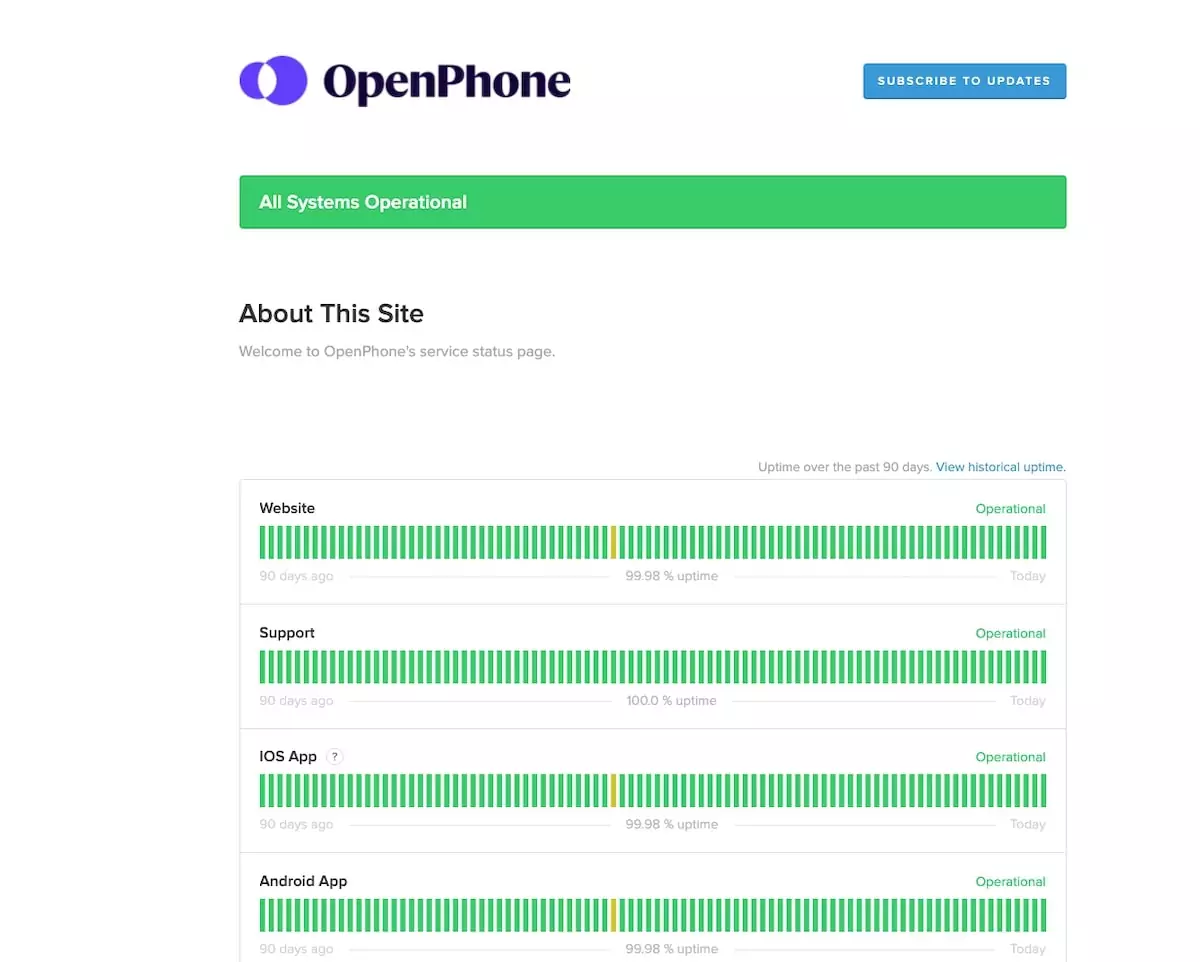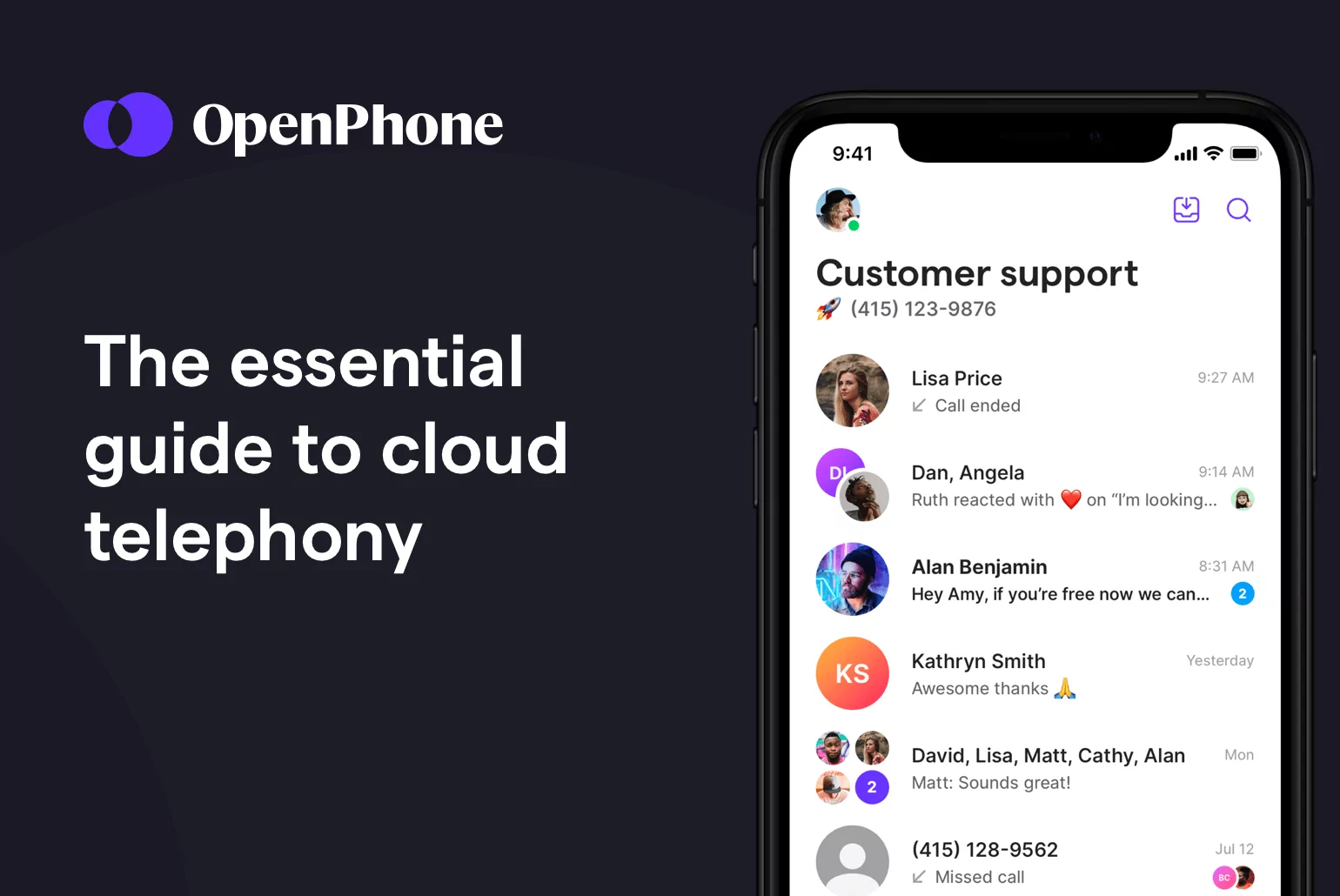The business world is changing fast, with international business, remote work, and technology now more important than ever before. To give your business an extra edge in this hyper-competitive world, you’ve likely begun exploring cloud telephony.
The cloud and the dispersed communication system it supports allow you to conduct business from home, client offices, cafes, or even an airplane thousands of miles above earth – when you’re literally in the clouds.
But how does cloud telephony work? What are its main benefits? And most importantly, how do you choose the best system for your business? If you’re considering making the switch, we can help answer your questions.
What is cloud telephony?
Cloud telephony is a type of unified communications system that allows your business phone system to operate via an internet connection. Also referred to as cloud calling, cloud telephony provides users access to business voice services. These services are virtual private branch exchange (PBX) solutions managed by third parties off-premise, meaning they’ll never fill up your office space. You’ll never have to worry about maintaining your system hardware either.
Cloud telephony isn’t limited to basic voice calling, either. From SMS and MMS messaging to file sharing to business integrations, cloud telephony offers a whole new realm of possibilities.
Your legacy phone system is no match for a cloud-hosted VoIP setup. A VoIP phone system offers so much more — a way to centralize customer relationship management (CRM) systems, communicate internally with your team, and (most importantly) streamline your business practices.
How does cloud telephony work?
Cloud telephony works exactly like most VoIP services. It converts analog voice data into data packets, which are then transmitted to the receiver over an internet connection. When the signal reaches the receiver, it’s converted back into sound waves, and your conversation gets underway without a noticeable hitch.
The cloud handles the entire call routing process, allowing you to access your phone systems through a web browser or mobile application. From your online dashboard, you’ll easily be able to assign numbers to your team, initiate call forwarding, and take advantage of the numerous calling features modern VoIP providers like OpenPhone offer. Your provider will take care of all the behind-the-scenes aspects of your business phone system.
In this way, cloud telephony releases you of the obligation to manage your own PBX/PABX. Your VoIP service provider will be the party responsible for building and operating the servers that run your new business phone system. You’re free to enjoy the convenience of your cloud telephony system, however you see fit — hosting two numbers on a single cell phone, enjoying a reliable internal messaging feature, or accepting a call on the beach. 🏖️
What are the major benefits of cloud telephony?
Now that you know more about cloud phone systems, it’s time to ask yourself, “Is cloud telephony the best solution for my business?” If you like modern user interfaces and phone systems that grow alongside your business, you’ll love the benefits of a cloud-based VoIP system like OpenPhone. We’ve outlined a few of the major perks below.
Simple-to-use
Tired of your PBX system gathering dust in the closet? How about dealing with the obnoxious copper wiring that seems to be everywhere? Or having to call in IT whenever you have a simple question?
With cloud telephony, you’ll be able to finally get rid of old-school, desk phone hardware. Best of all, you’ll still have access to all the traditional features you expect from a business phone system, plus lots of bonus features.
You’ll access your account information from a user-friendly dashboard, where intuitive design helps you navigate your way around available phone customization options.
OpenPhone lets you set business hours and enter detailed contact information, for instance, so you can stay organized and professional. We’ve designed our platform to streamline all your phone and text communication.
Scalable
With traditional business phone systems, you have to devote a large amount of time and effort to scaling them as your business grows. Every time you hire a new employee, you have to purchase a new desk phone, get the person trained, and try to anticipate the increased cost of your phone bill. The whole thing can quickly begin to feel like an expensive logistical nightmare.
With OpenPhone, there are no setup fees, and signing up for a new number takes only a couple of clicks on your phone or computer. Once you’re signed up, you’ll enjoy access to your phone system from anywhere on the planet, from any supported internet-enabled device.
It’s equally simple to add new team members and communicate internally. You’ll never again have to worry about equipping each employee with a cell phone or desk phone or waiting for equipment to arrive. OpenPhone works on any computer or smart device. Plus, OpenPhone’s user interface is sleek and easy to use. Your teammates will get the hang of our system in no time at all.
VoIP providers like OpenPhone give you the option of paying by the month or by the year. The amount you’re charged will depend on the number of users (or, more accurately, phone numbers) on your plan, not how many minutes your team spends on the phone or how many texts they send.
Always up-to-date
With traditional PBX systems, all of the wires and hardware remain on-premises. That means your in-house IT department (or whoever handles technical requests) is in charge of maintaining and updating your business phone system. Chances are updates don’t happen too frequently. When they do, they aren’t anything to call home about.
These updates may also drain your business bank account by requiring purchases of new equipment, servers, and other technology.
In contrast to legacy business phone systems, your service provider will handle all of the technical aspects of cloud telephony, like debugging and system maintenance. All you have to do is occasionally update your mobile application to have access to all the new features and improvements. It’s really that easy.
Flexible
Flexible working arrangements are on the rise in America. From remote and hybrid working models to bring your own device (BYOD) policies, businesses and employees alike are realizing the value of non-traditional working arrangements. And what better accompaniment to a modern work model than a modern business phone system?
Flexible workers have more autonomy over their work, which means it’s often carried out in a more efficient and timely fashion. Flexible workers also tend to stay longer with companies, with one 2022 FlexJobs survey revealing 56% of respondents stating having flexible work options as the biggest way employers can support them.
As a result, hybrid or remote workers cost companies less money on infrastructure and technology. Plus, this working style means they have more flexible business communications needs, as they won’t be tethered to their office desks all day long.
OpenPhone helps teams strike a healthy work-life balance while maintaining strong company-wide communications. After all, in a flexible working environment, communication is more important than ever before.
Money-saving
With each passing day, traditional business phone systems grow more costly to implement and maintain. That’s partially because telecommunications companies are only investing in newer technologies, like VoIP.
VoIP phone solutions allow you to manage your business communications for a fixed monthly cost. Your business can also expect to reduce (to zero) setup and maintenance costs. Whereas legacy phone systems grow more expensive over time, VoIP systems become more accessible and affordable.
How does cloud telephony differ from VoIP?
VoIP phone systems are an easy and efficient way to manage your business communications. But with all the technical jargon, you may find the terms “cloud telephony” and “VoIP” get misunderstood. The two are often used interchangeably, but you know that’s not entirely accurate. So, how exactly does cloud telephony differ from VoIP?
The main difference between cloud telephony and VoIP is that all cloud telephony is hosted in the cloud. Some VoIP providers still offer on-site VoIP setups, though. In other words, there are two kinds of VoIP phone systems: VoIP virtual hosted phone systems and on-premise VoIP PBX systems.
Keep in mind also that an on-premise PBX’s job is to serve as a call director. A hosted VoIP system, on the other hand, goes beyond directing calls and provides you with the professional phone system features your business needs.
In short, some (but not all) VoIP systems make use of the cloud, and specifically cloud telephony, to get your phone system up and running.
We recommend using a cloud-based VoIP service rather than an on-site system to get the most out of your phone plan. But with all the providers on the market today, choosing the best cloud-based VoIP solution is easier said than done.
6 tips to help you choose the best cloud telephony provider for your business
If you’re looking for a cloud-based phone system, you’ll want to explore your potential options before settling on a provider. Before clicking subscribe, take a look at these six tips to help you choose the best cloud telephony provider for your business.
1. Shortlist your must-have versus nice-to-have features
One of the most important aspects of choosing a VoIP provider is finding one that ticks all your boxes. Do you need call recording to ensure your call center is maintaining top-notch customer support? How about a sophisticated interactive voice response (IVR) menu for more streamlined call management?
Some of the top features to look for in a business phone system are:
- Voicemail: Make sure you don’t miss any messages with a reliable, professional voice messaging system. OpenPhone even offers a voicemail transcription feature, saving you time.
- Toll-free number availability: Using a toll-free number can help your business appear more professional and less city-specific, broadening your customer base.
- Auto-attendant abilities: For larger operations, an auto-attendant (or IVR) is a must-have. Auto-attendants direct callers to the appropriate members of your team, simplifying the process of receiving an inbound call.
- Shared phone numbers: With OpenPhone, you’re able to share a phone number with up to 10 people (on our Premium plan you can share a number with over 100 teammates). You’ll never receive a busy signal, even if all 10 are using the phone line simultaneously. It’s never been easier to keep the whole team up to speed.
- Snippets and auto-replies: These two features certainly don’t come standard with every VoIP provider, but they should. With OpenPhone’s snippets, you can create message templates to speed up your response time. To automatically respond to texts and calls with a predefined message, set up auto-replies. We help you provide top-of-the-line customer service, with a fraction of the time commitment on your end.
- Integrations: Save time and connect your OpenPhone account with the rest of your tech stack through our email, Slack, and Zapier integrations.
Every business will have a different set of priorities. The trick is to identify your must-haves and nice-to-haves. From there, it’ll be easier to compare VoIP services.
2. Check customer reviews
Businesses make claims about customer satisfaction and usability every day, but these claims aren’t always spot-on. You should always verify company claims against customer reviews. Thanks to the internet, that’s now easier than ever before.
Using G2 or any other software review database, you’ll be able to access a handy product rundown, complete with a list of features and customer feedback. OpenPhone is ranked number one for G2’s business phone category and has plenty of reviews to back it up as the best cloud phone system.
3. Look for their uptime

Verify the service quality of your potential new provider. While it’s impossible for a VoIP service to achieve a perfect 100% uptime score (although won’t stop us from trying), your VoIP provider should be close to perfect. They’re supporting your business communications and dropped calls and shaky call quality aren’t acceptable in a business environment. OpenPhone’s service status page allows you to monitor our uptime, so you can see firsthand the reliability and functionality of our service.
4. Reach out to providers you’re interested in with your questions
Once you’ve made your shortlist, get in touch with the providers who could be handling your future telephone system.
Reach out to ask any questions you may have and gain a better understanding of what kind of customer support they offer. After all, your business calls are on the line (pun intended), so you need to be sure your provider is available in case you experience technical difficulties or need help.
Often, cloud telephony services don’t prioritize the customer experience. They provide a phone service but not much in the way of advanced features or customer support. It may be a cost-effective business model, but it won’t do anything to make your business stand out. You need a 21st-century cloud communications system, complete with a customer service team that’s responsive — and shows they care.
If you ever have any questions about OpenPhone, our support team is just an email away.
5. Ensure you understand the full price of any cloud telephony solution
As with any business service, your VoIP system is an investment. To get the most value from this investment, you need to understand the full price — setup fees, maintenance, and subscription costs included. Sometimes, sifting through all the hidden charges to find the “real price” can be difficult.
OpenPhone is different. We’re completely transparent about our pricing model. Unlike some other VoIP providers, OpenPhone never charges any setup or maintenance fees. You’ll receive your bills monthly or annually at a set rate per user, and you can add additional phone numbers at a reduced cost. With OpenPhone, the price you see is the price you pay.
6. Review the security measures they have in place
At OpenPhone, we take your privacy seriously. We protect your information in several different ways, from our encrypted text messaging system to our daily data backup. To process payments, we use the PCI-compliant service Stripe, which has attained the highest security certification level in the payments industry. Your data is safe and your communications are secure with 256-bit AES encryption with OpenPhone.
You’ll never have to worry about a phone system security fiasco because you know you’re in good hands.
Use OpenPhone, the best cloud telephony service

Are you tired of the hassle of traditional phone systems? Maybe the last straw was having to order yet another set of handsets. Or maybe you’re just looking to do away with landlines in favor of a more modern communication solution. OpenPhone can help you communicate more efficiently — and effectively — with your customers. Sign up for your free trial today to learn more about what OpenPhone is all about.
